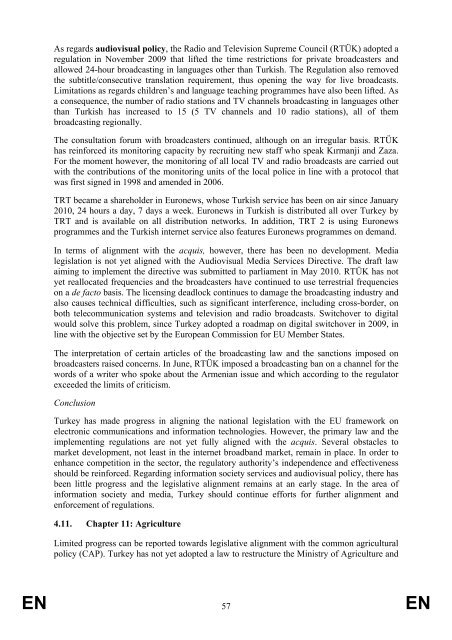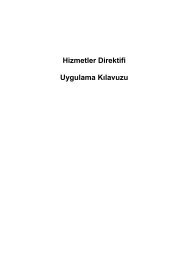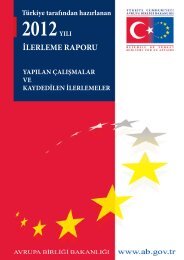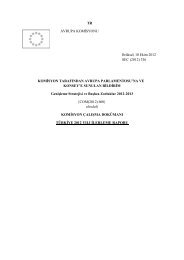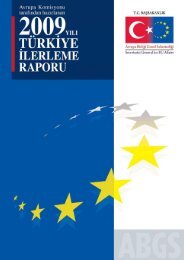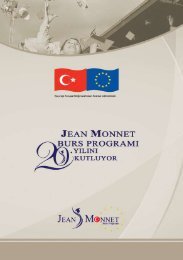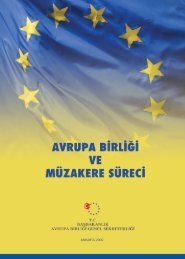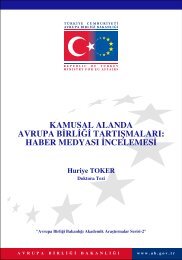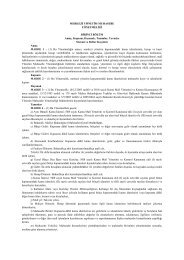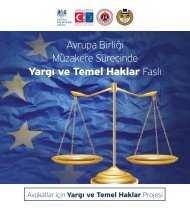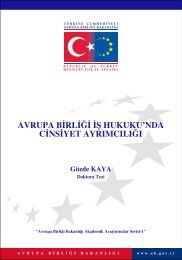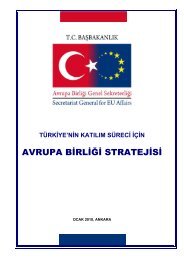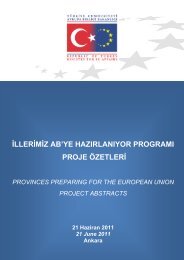2010 ilerleme raporu - Avrupa Birliği Bakanlığı
2010 ilerleme raporu - Avrupa Birliği Bakanlığı
2010 ilerleme raporu - Avrupa Birliği Bakanlığı
Create successful ePaper yourself
Turn your PDF publications into a flip-book with our unique Google optimized e-Paper software.
As regards audiovisual policy, the Radio and Television Supreme Council (RTÜK) adopted aregulation in November 2009 that lifted the time restrictions for private broadcasters andallowed 24-hour broadcasting in languages other than Turkish. The Regulation also removedthe subtitle/consecutive translation requirement, thus opening the way for live broadcasts.Limitations as regards children’s and language teaching programmes have also been lifted. Asa consequence, the number of radio stations and TV channels broadcasting in languages otherthan Turkish has increased to 15 (5 TV channels and 10 radio stations), all of thembroadcasting regionally.The consultation forum with broadcasters continued, although on an irregular basis. RTÜKhas reinforced its monitoring capacity by recruiting new staff who speak Kırmanji and Zaza.For the moment however, the monitoring of all local TV and radio broadcasts are carried outwith the contributions of the monitoring units of the local police in line with a protocol thatwas first signed in 1998 and amended in 2006.TRT became a shareholder in Euronews, whose Turkish service has been on air since January<strong>2010</strong>, 24 hours a day, 7 days a week. Euronews in Turkish is distributed all over Turkey byTRT and is available on all distribution networks. In addition, TRT 2 is using Euronewsprogrammes and the Turkish internet service also features Euronews programmes on demand.In terms of alignment with the acquis, however, there has been no development. Medialegislation is not yet aligned with the Audiovisual Media Services Directive. The draft lawaiming to implement the directive was submitted to parliament in May <strong>2010</strong>. RTÜK has notyet reallocated frequencies and the broadcasters have continued to use terrestrial frequencieson a de facto basis. The licensing deadlock continues to damage the broadcasting industry andalso causes technical difficulties, such as significant interference, including cross-border, onboth telecommunication systems and television and radio broadcasts. Switchover to digitalwould solve this problem, since Turkey adopted a roadmap on digital switchover in 2009, inline with the objective set by the European Commission for EU Member States.The interpretation of certain articles of the broadcasting law and the sanctions imposed onbroadcasters raised concerns. In June, RTÜK imposed a broadcasting ban on a channel for thewords of a writer who spoke about the Armenian issue and which according to the regulatorexceeded the limits of criticism.ConclusionTurkey has made progress in aligning the national legislation with the EU framework onelectronic communications and information technologies. However, the primary law and theimplementing regulations are not yet fully aligned with the acquis. Several obstacles tomarket development, not least in the internet broadband market, remain in place. In order toenhance competition in the sector, the regulatory authority’s independence and effectivenessshould be reinforced. Regarding information society services and audiovisual policy, there hasbeen little progress and the legislative alignment remains at an early stage. In the area ofinformation society and media, Turkey should continue efforts for further alignment andenforcement of regulations.4.11. Chapter 11: AgricultureLimited progress can be reported towards legislative alignment with the common agriculturalpolicy (CAP). Turkey has not yet adopted a law to restructure the Ministry of Agriculture andEN 57 EN


